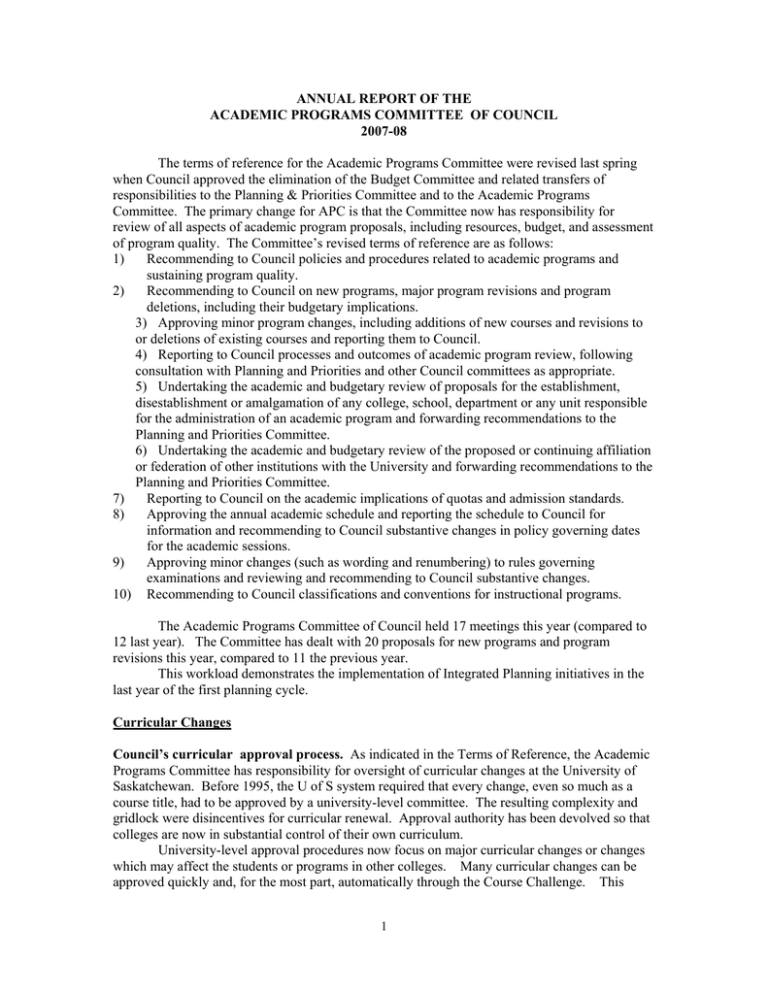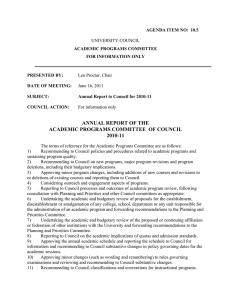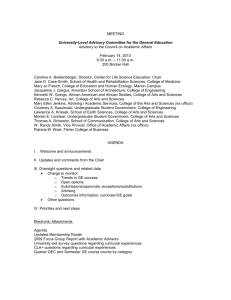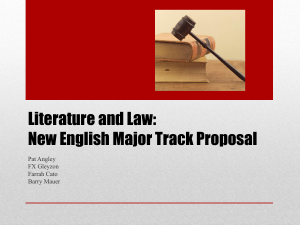ANNUAL REPORT OF THE ACADEMIC PROGRAMS COMMITTEE OF COUNCIL 2007-08
advertisement

ANNUAL REPORT OF THE ACADEMIC PROGRAMS COMMITTEE OF COUNCIL 2007-08 The terms of reference for the Academic Programs Committee were revised last spring when Council approved the elimination of the Budget Committee and related transfers of responsibilities to the Planning & Priorities Committee and to the Academic Programs Committee. The primary change for APC is that the Committee now has responsibility for review of all aspects of academic program proposals, including resources, budget, and assessment of program quality. The Committee’s revised terms of reference are as follows: 1) Recommending to Council policies and procedures related to academic programs and sustaining program quality. 2) Recommending to Council on new programs, major program revisions and program deletions, including their budgetary implications. 3) Approving minor program changes, including additions of new courses and revisions to or deletions of existing courses and reporting them to Council. 4) Reporting to Council processes and outcomes of academic program review, following consultation with Planning and Priorities and other Council committees as appropriate. 5) Undertaking the academic and budgetary review of proposals for the establishment, disestablishment or amalgamation of any college, school, department or any unit responsible for the administration of an academic program and forwarding recommendations to the Planning and Priorities Committee. 6) Undertaking the academic and budgetary review of the proposed or continuing affiliation or federation of other institutions with the University and forwarding recommendations to the Planning and Priorities Committee. 7) Reporting to Council on the academic implications of quotas and admission standards. 8) Approving the annual academic schedule and reporting the schedule to Council for information and recommending to Council substantive changes in policy governing dates for the academic sessions. 9) Approving minor changes (such as wording and renumbering) to rules governing examinations and reviewing and recommending to Council substantive changes. 10) Recommending to Council classifications and conventions for instructional programs. The Academic Programs Committee of Council held 17 meetings this year (compared to 12 last year). The Committee has dealt with 20 proposals for new programs and program revisions this year, compared to 11 the previous year. This workload demonstrates the implementation of Integrated Planning initiatives in the last year of the first planning cycle. Curricular Changes Council’s curricular approval process. As indicated in the Terms of Reference, the Academic Programs Committee has responsibility for oversight of curricular changes at the University of Saskatchewan. Before 1995, the U of S system required that every change, even so much as a course title, had to be approved by a university-level committee. The resulting complexity and gridlock were disincentives for curricular renewal. Approval authority has been devolved so that colleges are now in substantial control of their own curriculum. University-level approval procedures now focus on major curricular changes or changes which may affect the students or programs in other colleges. Many curricular changes can be approved quickly and, for the most part, automatically through the Course Challenge. This 1 allows the Academic Programs Committee to focus on the major curricular innovations and improvements which colleges propose. The Committee also deals with wider academic and curricular policy issues, and acts as a reference and approval body for various academic policies and policy exemptions for the Student and Enrolment Services Division . New Programs and major program revisions. The Academic Programs Committee reviews major curricular innovations and improvements and makes recommendations to Council regarding approval. The Academic Programs Committee has also been delegated the authority to approve several types of program changes from colleges, including new Options and Minors in new fields of specialization. This improves Council’s ability to handle these types of program changes more quickly and efficiently, while still maintaining a university-level review of the changes to maintain quality and resolve any conflicts with other colleges. The following proposals for new programs and program revisions were dealt with by APC this year: Agriculture & Bioresources BSc in Renewable Resource Management BSA: Reduction of credit units Diploma in Agribusiness and Diploma in Agronomy, to replace the Diploma in Agriculture; termination of diploma fields of specialization in Animal Science and General Agriculture BSA: Reinstatement of the Agronomy major Arts & Science Bachelor of Arts and Science degree structure BA: Change of name for RUD program BA: Anthropology program revisions Minor in Water Science Medicine/ Arts & Science BSc: Biomedical Sciences program revisions and professional college admission requirements Graduate Studies & Research Master of Public Administration Master of Education: Course-based Program Option in Educational Administration and Educational Foundations and related changes to project options Master of Music: Reinstatement and revision of Performance Option Graduate programs in Environment and Sustainability MSc and PhD programs in Health Sciences Master of Nursing: Revisions to the Nurse Practitioner Option Engineering Bachelor of Engineering in Environmental Engineering degree Review of the following proposals will continue in September, 2008: Agriculture & Bioresources Program termination for Cooperative Education Program Arts & Science 2 Minor in Biotechnology and Social Change Edwards School of Business Program termination for Major in Biotechnology Management The Committee also reviewed a proposal for a PhD in Economics, which was referred back to CGSR until resource issues can be dealt with. Course Challenge. Course challenge is an approval process which allows for efficient but collegial review of curricular revisions. Course challenges are posted on the Course Challenge website at www.usask.ca/university_council/acad_prog/challenges.shtml. Since May 2007, a total of 16 Course Challenge documents have been posted (compared to 12 posted the previous year): New courses, prerequisite changes and course deletions: Agriculture & Bioresources, Arts & Science, Business, Dentistry, Education, Engineering, Graduate Studies & Research, Kinesiology, Law, Medicine. New minors: Arts and Science: Minor in Toxicology Program changes: Agriculture & Bioresources: changes to Agricultural Biology program; deletion of minor in Agricultural Economics Arts & Science: program changes in Art & Art History; Languages & Linguistics; Philosophy; Geography; International Studies; Land Use & Environmental Studies; Northern Studies; Regional & Urban Planning; Sociology; Biochemistry; Bioinformatics; Biology; Biology & Biotechnology; Computer Science; Food Science; Geophysics; Microbiology & Immunology. Graduate Studies & Research: Master of Business Administration Engineering: program changes in majors; deletion of Biotechnology Option in Chemical Engineering program One curricular change was challenged this year and the challenge was resolved by the Provost & VP Academic. Other curricular changes: Authority for approval of many other curricular changes, such as course titles and descriptions, has been delegated to colleges. In some cases, such as changes of course labels, this should be done in consultation with SESD. Changes of this type which affect the Calendar listings of other colleges can be posted for information in a course challenge posting. In addition, changes to non-university-level programs, such as certificates of successful completion and certificates of attendance are authorized by the Dean and/or the Provost and Vice-President Academic. The Approval Authority chart is located at www.usask.ca/university_council/acad_prog/reports/changes_chart.shtml Proposal forms, examples, and other information about approval procedures is available on the Committee’s website at www.usask.ca/university_council/acad_prog/procedures.shtml Policies and Procedures There are a number of areas of Council policy and procedures which are reviewed on a regular basis by the Academic Programs Committee. These include issues around implementation of the enrolment plan, exam regulations, admission policies and procedures, and other areas of interest to students and faculty. This year, the Academic Programs Committee dealt with the following policy issues: 3 Revision of the Program Termination Procedure This procedure was approved by Council in 2002. Revisions were required when responsibility for terminations and for program quality were given to the Academic Programs Committee last spring. The Academic Programs Committee prepared a revised procedure and this was approved at the April meeting of Council. Challenge for Credit policy review Council approved the Challenge for Credit policy in 2002. This policy allows the award of course credit to students who qualify for Prior Learning Assessment and Recognition (PLAR). At that time, the Academic Programs Committee also agreed to review the policy at a later time to determine whether any revisions were required. SESD reported to the Committee in January about the operation of PLAR and this was subsequently discussed by the Associate and Assistant Deans. The report and memo is attached. At its meeting on May 9, 2008, the Committee approved the following motion: That we accept the Challenge for Credit recommendations from Dr. Hannah and continue with the program. Referral from Coordinating Committee: On-line Calendar issue Academic Programs Committee reported on this issue to the May meeting of Council. It was noted in that report that SESD will produce an “Advisors Guide” available summer 2008, which will contain all of the program and course information formerly published in the General Calendar, as well as relevant university regulations. Academic schedule The Committee reviewed and approved the 2008-09 Academic Schedule. This was reported to the January, 2008 meeting of Council. Policy exemptions The Committee was not asked to deal with any exemptions to academic policies this year. Discussions The Committee discussed drafts of the Teaching and Learning Foundational Document and the Framework for Assessment document. Deadlines This year the Committee experienced a significant problem with proposal documents arriving late. Of the 20 programs reviewed by the Committee this year, only five were submitted before Christmas; seven arrived after the first of May. The expectation that all programs and courses will be approved for implementation in September creates a difficult challenge, both for the Committee to provide the rigorous review of proposals which Council expects, and for SESD to undertake the necessary programming so that courses and programs are set-up for registration. This is also complicated because SESD is responding to long-standing student demands for earlier registration; this year registration is beginning in mid-June. The Committee has agreed on the following procedure: 4 - when a College submits a fully completed proposal by March 15, the Committee and SESD promises to deal with it in a timely manner, with the goal to achieve implementation of the new program in September - incomplete proposals or proposals submitted following March 15 will receive lower priority and there are no guarantees. However, both the Committee and SESD will still try their best to deal with approval and implementation in as short a timeline as possible. Members of the Academic Programs Committee Due to changes to Committee terms of reference approved last spring, the membership in the Academic Programs Committee was increased. Council Members (5) Trever Crowe (Chair) Gordon Hill Francois Messier Phyllis Shand Greg Wurzer Agriculture & Bioresource Eng. Chemical Engineering Biology Applied Microbiology & Food Science Library (Law) General Academic Assembly Members (6) Hilary Clark English Len Proctor Curriculum Studies Fred Remillard Pharmacy & Nutrition Roger Maaka Native Studies Li Chen Electrical & Computer Engineering Michel Desautels Physiology Sessional Lecturer Elaine Hulse Education Undergraduate Student Member Josie Steeves VP Academic, USSU for 2007-08 Brea Lowenberger VP Academic, USSU for 2008-09 Graduate Student Member Josiah Obero/ Samuel Adaramola VP Academic, GSA for 2007-08 Xiaodong (Daniel) Zhang VP Academic, GSA for 2008-09 Ex Officio David Hannah Kelly McInnes Associate Vice-President Academic Registrar Ex Officio (non-voting) Marion Van Impe VP Finance designate Resource Personnel (Non-voting) Pauline Melis Director of Institutional Planning Jim Spinney Director of Budget Planning Administrative Support Cathie Fornssler (Secretary) University Secretary’s Office 5 I wish to thank Committee members for their willingness to undertake detailed and comprehensive reviews of program proposals. Their commitment to excellence and high standards resulted in improved programs for the University of Saskatchewan. In particular, I am grateful to Gordon Hill and Francois Messier who acted as vice-chairs of the Committee this year. Respectfully submitted on behalf of the Committee, Trever Crowe, Chair ATTACHMENT: SESD report on Challenge for Credit policy 6


